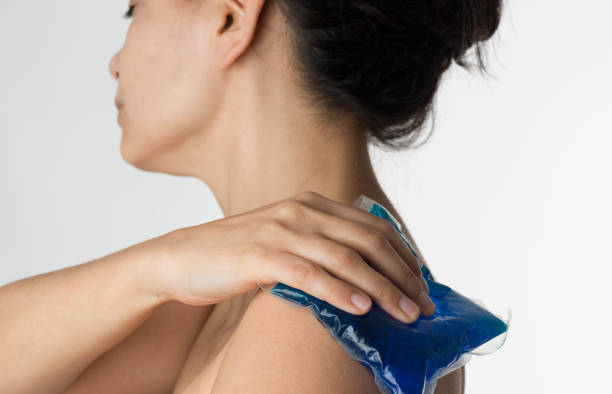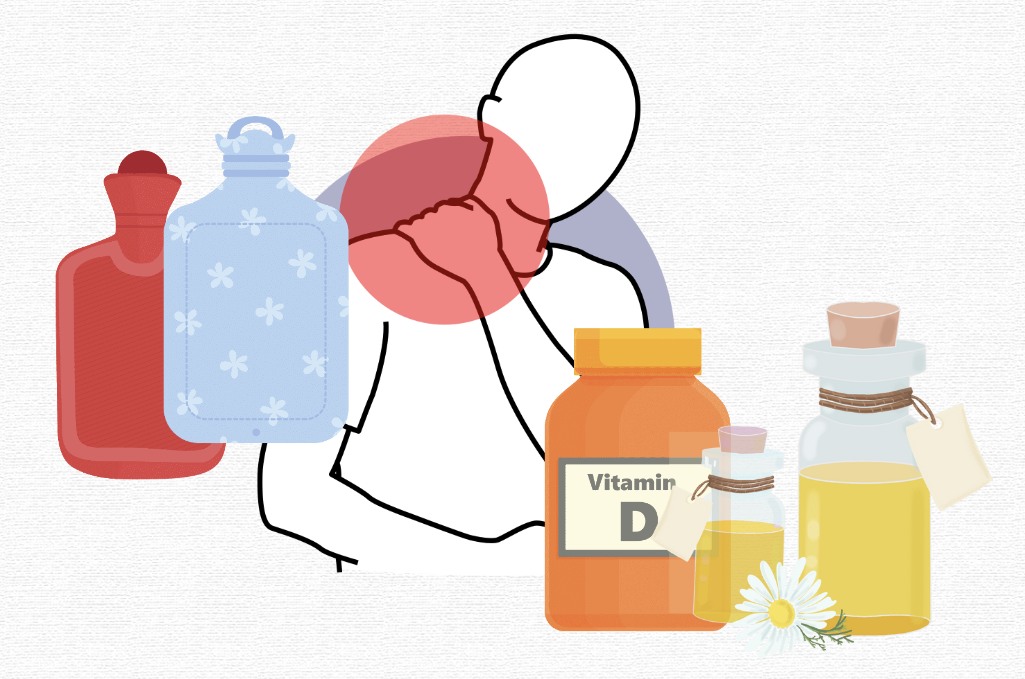Health Conditions
Best Natural Remedies for a Frozen Shoulder
People suffering from the discomfort and limited mobility caused by frozen shoulder can find relief through natural remedies, which offer a holistic approach to addressing this tough disease. Frozen shoulder, also known as adhesive capsulitis, can seriously impair daily activities, making even simple chores difficult. While standard therapies such as physical therapy and pharmaceuticals might be useful, many people choose alternative methods to alleviate symptoms and promote healing.
In this article, we’ll look at evidence-based treatments, herbal remedies, and lifestyle modifications that can alleviate frozen shoulder pain and promote the body’s natural healing processes. Whether you wish to supplement standard therapy or take a more holistic approach, join us as we look at the various natural solutions available to reduce pain and restore movement in frozen shoulder sufferers.

Understanding Frozen Shoulder
Frozen shoulder, also known as adhesive capsulitis, is a disorder that causes discomfort and stiffness in the shoulder joint. It is a prevalent disorder affecting both men and women, typically between the ages of 40 and 60. Injury, diabetes, and thyroid issues are all possible causes of a frozen shoulder.
Causes and Risk Factors
The actual cause of a frozen shoulder is unknown, but it is thought to be caused by inflammation in the shoulder joint. Injury to the shoulder, diabetes, and thyroid issues are all risk factors for developing a frozen shoulder. Other risk factors include being female, having had surgery or a shoulder injury, and being above the age of forty.
Symptoms and Stages
Frozen shoulder symptoms include discomfort and stiffness in the shoulder joint. The situation progresses in three stages: freezing, frozen, and thawing. During the freezing stage, the shoulder becomes more painful and stiff, making movement difficult. The frozen stage is distinguished by a reduction in pain while the shoulder remains stiff. Finally, during the thawing process, the shoulder gradually regains its range of motion.
Diagnosis of Frozen Shoulder
A frozen shoulder is diagnosed through a physical examination and a review of the patient’s medical history. Imaging tests, such as X-rays or MRI scans, may be required to rule out other illnesses that could be causing the symptoms. In some circumstances, a doctor may do a joint aspiration, which involves removing a small amount of fluid from the shoulder joint and examining it for inflammation.
In conclusion, understanding the origins, symptoms, and stages of a frozen shoulder is critical for accurate diagnosis and therapy. If you are suffering pain and stiffness in your shoulder joint, you should consult a doctor for an accurate diagnosis.

Natural Remedies for Managing Frozen Shoulder
While doctors can prescribe a variety of therapies for a frozen shoulder, natural remedies are the most successful. Here are some natural solutions that can help with frozen shoulder.
Heat and Cold Therapy
Heat and cold therapy can help reduce inflammation, discomfort, and stiffness. Ice can be administered to the shoulder for 15-20 minutes at a time, several times each day, to relieve inflammation and pain. Cold showers can also assist in relieving inflammation and soreness. Heat therapy, such as a warm compress or hot water bottle, can help to increase blood flow and relieve stiffness.
Supplements and Anti-Inflammatories
Supplements and anti-inflammatories can help lessen the inflammation and pain caused by a frozen shoulder. Magnesium supplements can help muscles relax and reduce pain. Turmeric, ginger, and vitamin D are all powerful anti-inflammatory supplements. However, before taking any supplements or anti-inflammatory medicines, you should contact with your doctor.
Herbal Treatments and Home Remedies
Herbal medicines and home remedies might also be useful in treating frozen shoulders. DMSO, a natural solvent, can be used topically to relieve inflammation and pain. Chamomile, lavender, and eucalyptus are herbal treatments that can be used in massage oils or compresses to relieve pain and stiffness. Home treatments like apple cider vinegar and honey can also help reduce inflammation and discomfort.
Overall, natural remedies can be useful in treating frozen shoulders. However, it is critical to contact a doctor before attempting any new therapy.

Exercise and Physical Therapy
Physical and exercise therapy are crucial components of a frozen shoulder treatment strategy. These therapies aim to stretch the tissues in the shoulder and restore movement to the joint. In this part, we’ll go over the numerous exercises and physical therapy approaches that can help relieve the symptoms of a frozen shoulder.
Stretching Exercises
Stretching exercises aim to increase the range of motion in the shoulder joint. These exercises are done slowly and softly to avoid irritating the shoulder capsule. Here are some stretching exercises that can help with a frozen shoulder:
Finger Walk: Stand facing a wall, your affected arm at your side. Use your fingers to guide your hand as far up the wall as possible without causing pain. Hold the stretch for 15-30 seconds before slowly lowering your arm back down. Repeat 10 to 15 times.
Cross-Body Stretch: Bring your affected arm across your body, then gently bring it towards your chest with your other hand. Hold the stretch for 15-30 seconds before progressively releasing. Repeat 10 to 15 times.
Strengthening Exercises
Strengthening exercises are intended to increase the strength of the muscles of the shoulder. To avoid pain, practice these exercises gently and with control. Here are some examples of strengthening exercises that can help with a frozen shoulder.
Pendulum Exercise: Lean forward, placing your unaffected arm on a table or chair. Allow your affected arm to dangle down while gently swinging it back and forth and side to side. Repeat 10 to 15 times.
Rotator Cuff Strengthening: Lie on your unaffected side, with your affected arm resting on your side. Raise your arm to shoulder height before slowly lowering it back down. Repeat 10 to 15 times.
Physical Therapy Techniques
Massage and joint mobilization are two physical therapy procedures that might be beneficial in treating a frozen shoulder. Physical therapists often perform these techniques, which may include:
Soft Tissue Massage: This technique involves applying pressure to the muscles and soft tissues surrounding the shoulder joint to assist relieve pain and increasing the range of motion.
Joint Mobilization: This entails gently rotating the shoulder joint in various directions to improve the range of motion and alleviate pain.
Incorporating exercise and physical therapy into the treatment regimen is crucial for managing a frozen shoulder effectively. Engaging in stretching and strengthening routines aids in enhancing shoulder joint flexibility and muscle strength, whereas physical therapy modalities like massage and joint mobilization play pivotal roles in reducing discomfort and facilitating the recovery process.

Lifestyle and Recovery
Managing Daily Activities
A frozen shoulder is a painful and uncomfortable ailment that can impair one’s ability to conduct regular tasks. To handle daily activities, keep an appropriate posture and avoid any actions that cause discomfort or pain. A hot or cold pack can also assist in alleviating muscle spasms and pain.
To avoid further stiffness, keep the affected arm mobile and active. Gentle stretches and exercises prescribed by a healthcare physician or physical therapist can help to increase the range of motion and facilitate rehabilitation.
Long-Term Management
Long-term care for a frozen shoulder requires a combination of lifestyle changes and medicinal interventions. In some circumstances, surgery may be required to remove scar tissue and increase mobility. However, most cases can be treated without surgery, such as physical therapy, massage, and acupuncture.
It is also critical to live a healthy lifestyle, which includes eating a well-balanced diet, exercising regularly, and managing stress. These lifestyle adjustments can help to prevent more nerve damage and enhance overall recovery.
In conclusion, regulating everyday activities and living a healthy lifestyle can assist in reducing discomfort and promote recovery in those with frozen shoulders. It is critical to collaborate with a healthcare professional or physical therapist to create a tailored treatment plan that addresses individual requirements and goals.
Conclusion
Finally, looking into natural remedies for frozen shoulder is a promising option for people looking for new ways to manage this difficult illness. Natural remedies range from herbal supplements and topical treatments to therapeutic procedures such as acupuncture and chiropractic care, providing a wide range of possibilities for symptom relief and healing for frozen shoulder.
While these solutions may not completely replace traditional treatments, they can supplement existing therapies and provide additional support for people dealing with the challenges of a frozen shoulder. By mixing these natural remedies into a comprehensive treatment plan tailored to individual needs, patients may experience pain alleviation and better shoulder mobility, allowing them to reclaim their quality of life and well-being. To guarantee the safety and success of a new treatment regimen, consult with a healthcare expert before beginning it.
Trusted Health, Wellness, and Medical advice for your well-being


